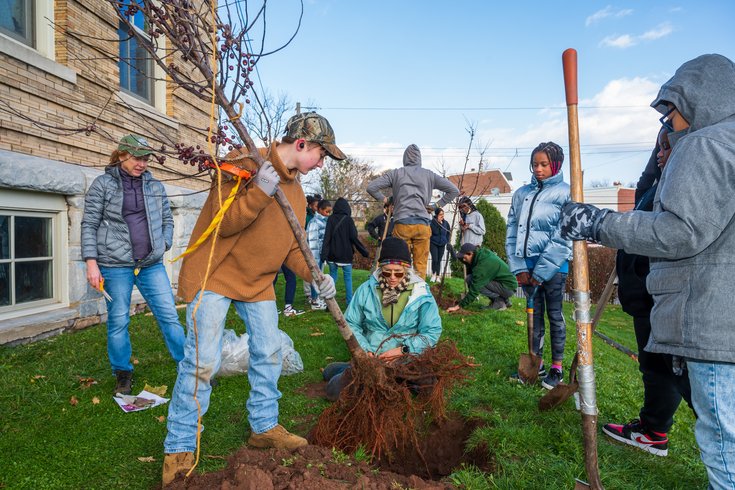
November 07, 2023
 Provided image/Pennsylvania Horticultural Society
Provided image/Pennsylvania Horticultural Society
PHS volunteers plant a new tree at a November 2022 event.
In less than two weeks, crews will fan out across Philadelphia for a four-day planting blitz that will leave the city with 1,770 new trees.
The Pennsylvania Horticultural Society recently announced plans for the Nov. 16-19 event, calling on volunteers to assist in the initiative. No previous experience is required, as new volunteers will be trained by the organization's 180+ Tree Tender groups in the Philadelphia area. The PHS is directing interested residents to sign up for a planting online. The process typically takes 2-3 hours per site, and plantings will proceed rain or shine.
Research has found that a substantial tree canopy — defined as the leaves, branches and stems that cover the sky when viewed from below — can improve the mental health of residents and even help them live longer. In a 2023 study, the U.S. Forest Service concluded that for every 100 trees planted in an area, there was about one less non-accidental death per year. Larger, leafy trees have been linked to fewer prescriptions for mood disorders and cardiovascular disease.
A Penn study from 2018 found that greening vacant urban lots reduced nearby residents' depression. That same year, researchers at Columbia reported a 29% drop in gun violence in areas with "treated" vacant lots.
Expanding Philadelphia's tree canopy has been a particular focus for the PHS, which says it has planted over 30,000 trees in the region since 1991. But the mission has faced setbacks in recent years. A 2019 report found that Philly's tree canopy shrank by 6% between 2008 and 2018, the equivalent of about 1,000 football fields. Only 20% of Philadelphia was covered by tree canopy, the report continued, and the distribution across neighborhoods was not equitable. This lines up with more recent research on the urban heat island effect in the city, which makes areas like South Philly, Kensington and parts of West Philly feel up to 10 degrees hotter than the actual temperature.
PHS was one of several groups involved in the new Philly Tree Plan, unveiled in February, that calls for a multi-pronged investment in the city's "urban forest." The plan is designed to help Philadelphia meet a previously established goal of 30% tree coverage by 2035, with targeted actions in underserved areas. If the city is successful, it projects it will prevent 400 premature deaths per year and reduce crime by 12%.
Follow Kristin & PhillyVoice on Twitter: @kristin_hunt
| @thePhillyVoice
Like us on Facebook: PhillyVoice
Have a news tip? Let us know.